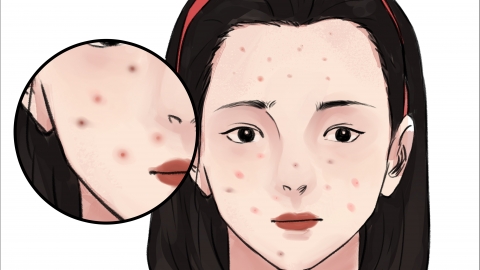How to deal with many acne scars and pits on the face?
Generally, having many acne marks and scars on the face may be caused by improper diet, hormonal changes, genetic factors, eczema, folliculitis, and other reasons. It is recommended to seek timely medical advice to identify the cause and then take appropriate treatment measures under the guidance of a professional doctor, such as general treatment, medication, or surgical treatment. A detailed analysis is as follows:

1. Improper Diet
People's dietary habits may change with the seasons. Consuming excessive oily, spicy, or sweet foods during seasonal transitions may lead to improper diet, stimulating abnormal secretion of sebaceous glands and causing symptoms such as many acne marks and scars on the face. It is recommended to adjust your diet, eat more fresh vegetables and fruits, and maintain a balanced diet.
2. Hormonal Changes
If hormonal levels change, such as during puberty, menstrual cycles, or pregnancy, it may lead to increased oil production on facial skin, leaving acne marks and scars. This may be accompanied by symptoms such as menstrual irregularities, mood swings, and weight changes. It is recommended to regulate lifestyle habits, ensure adequate sleep, maintain a balanced diet, and reduce stress. Additionally, under a doctor's guidance, medications such as spironolactone tablets, fusidic acid cream, or erythromycin ointment may be used.
3. Genetic Factors
Due to genetic factors, an individual's skin cell regeneration and repair ability may be weak, making it difficult to recover to its original condition after damage, thus causing many acne marks and scars on the face. It is recommended to improve the condition through laser treatments under a doctor's guidance. These methods can stimulate skin cell regeneration and collagen production, thereby reducing the severity of acne marks and scars.
4. Eczema
If facial skin remains in a moist and poorly ventilated environment for a prolonged period, eczema may develop, which can lead to many acne marks and scars on the face. Symptoms may also include itching and blisters. Under a doctor's guidance, medications such as hydrocortisone cream, Shiduqing capsules, or calamine lotion may be used for treatment.
5. Folliculitis
Poor personal hygiene habits may lead to Staphylococcus aureus infection on facial skin, which can cause folliculitis. Under the stimulation of inflammation, the keratin layer at the hair follicle openings on the face may thicken, resulting in many acne marks and scars. Symptoms may also include redness and pain. It is recommended to use medications such as minocycline hydrochloride capsules, mupirocin ointment, or fusidic acid cream under the guidance of a doctor.
In daily life, it is recommended to keep the face clean and use gentle skincare products. At the same time, maintaining good lifestyle and dietary habits can also help improve skin condition and prevent the formation of acne marks and scars.








